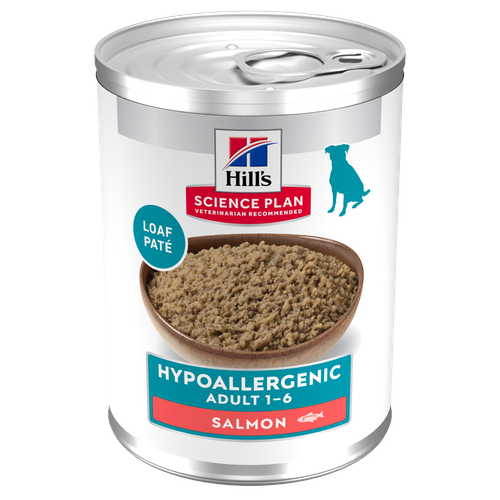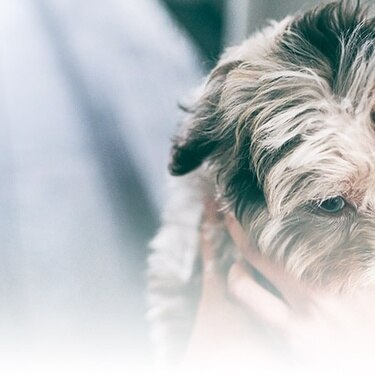
-
Find the right food for your petTake this quiz to see which food may be the best for your furry friend.Find the right food for your petTake this quiz to see which food may be the best for your furry friend.Featured products
 Adult Wet Dog Food with Beef
Adult Wet Dog Food with BeefHill's Science Plan Adult Multipack Wet Dog Food with Chicken, Beef & Turkey are complete premium pet foods for adult dogs from 1 year. Your dog will love these deliciously smooth and savoury minced loaves, formulated for balanced nutrition and overall health.
Shop Now Puppy Food
Puppy FoodHill's Science Plan Puppy Multipack Wet Dog Food with Chicken & Beef are complete premium pet foods for growing puppies from weaning until 1 year old and for pregnant and nursing dogs. Your puppy will love these deliciously smooth and savoury minced loaves, formulated for balanced nutrition and overall health.
Shop Now Mature Adult Dog Food
Mature Adult Dog FoodHill's Science Plan Mature Adult Multipack Wet Dog Food with Chicken & Beef are complete premium pet foods for mature adult dogs from 7 years. Your dog will love these deliciously smooth and savoury minced loaves, formulated to deliver the appropriate amount of energy to support the needs of adult dogs.
Shop NowFeatured products Light Adult Multipack Wet Cat Food with Chicken & Ocean Fish
Light Adult Multipack Wet Cat Food with Chicken & Ocean FishTender chicken chunks in gravy for cats, with L-carnitine and fewer calories for ideal weight management. Packed with high-quality protein, omega-6s, and vitamin E for shiny fur and healthy skin.
Shop Now Adult Multipack Wet Cat Food with Beef, Ocean Fish & Chicken
Adult Multipack Wet Cat Food with Beef, Ocean Fish & ChickenTender chunks in gravy for cats, with high-quality protein to maintain lean muscle. With vitamin E and omega-3s & -6s for healthy skin and balanced minerals to support healthy vital organs.
Shop Now Mature Adult Wet Cat Food with Chicken
Mature Adult Wet Cat Food with Chicken
Tender chicken chunks in gravy for mature adult cats. Made with easy-to-digest ingredients, high-quality protein for lean muscle maintenance and antioxidant vitamins C+E for optimal health.
Shop Now -
Dog
- Dog Tips & Articles
-
Health Category
- Weight
- Food & Environmental Sensitivities
- Urinary
- Digestive
- Joint
- Kidney
-
Life Stage
- Puppy Nutrition
- Adult Nutrition
- Senior Nutrition
Cat- Cat Tips & Articles
-
Health Category
- Weight
- Skin & Food Sensitivities
- Urinary
- Digestive
- Kidney
-
Life Stage
- Kitten Nutrition
- Adult Nutrition
Featured articles The Right Diet For Your Pet
The Right Diet For Your PetIn people, the right diet is very important. If you are eating the wrong way for your metabolism, activity level, age and lifestyle you could end up with health issues.
Read More The Incredible Science Behind Your Pet's Microbiome
The Incredible Science Behind Your Pet's MicrobiomeLearn what your pet's microbiome is, how it contributes to your pet's gut and overall health, and why nutrition is important in maintaining healthy microbiomes.
Read More Show some love with wet foods: a great choice for pets with health issues
Show some love with wet foods: a great choice for pets with health issuesShow some love with wet foods: a great choice for pets with health issues.
Read More -


Dogs make a variety of sounds to express different wants, needs and feelings, but a dog's howl, in particular, is unmistakable. The reason for their howling, on the other hand, is not always so clear. So why exactly does a dog howl? Read on to find out.

Why Do Dogs Howl?
Howling is a deeply ingrained behaviour. A dog's howl, similar to a wolf's, is a loud, drawn-out, mournful cry. It differs from a bark, which is typically brief and explosive.
A dog may howl for some of the same reasons wolves do. However, as dogs have evolved and grown closer to humans, some of their reasons for howling may have also evolved. Here are several reasons why your dog might howl:
- To signal to the pack. Like wolves, dogs howl to communicate with other members of their pack, signal their presence, or indicate their location, says PetHelpful. This is not only true of wild dogs who run in actual packs, but also domestic dogs who view their human family and caretakers as their pack. This may explain why your dog howls when you or another family member has been away from home for a while.
- To ward off predators and announce their territory. Dogs use howling to declare their territory to rival dogs and potential threats and warn them to keep away. This might be why one howling dog can trigger every dog in the neighbourhood to start howling — they're all sounding off to let each other know who occupies which territory.

- As a response to noise. Your dog may howl in response to a nearby siren, a musical instrument, a sound on the television or your own singing. While this may mean they’re protesting because they dislike the noise, it could just as easily mean they like it and want to join in!
- To express their emotions. Dogs may howl to express a wide range of emotions, says PetHelpful, including triumph, excitement, fear, loneliness, irritation, sadness, and anxiety. Blue Cross explains that some dogs experience separation anxiety and will often howl when their pet parents leave them alone.
- To express pain. Dogs in physical pain or discomfort may howl to let their pet parents know they need attention. If the reason for your dog's howling is unclear, it's a good idea to check them out for signs of dog pain. If they continue howling and you can't figure out why, reach out to your veterinarian.
You'll also probably notice that your dog likes to tilt their head to the sky to let out their vocalisation. There are a variety of reasons why dogs will tilt their heads, but there is little information on why dogs might "howl at the moon." Many people speculate that this is because it straightens out the vocal cords and provides more airflow from the chest to allow them to provide this type of vocalisation. Others speculate that it allows the sound waves to travel further, letting more dogs or creatures know they are there.


Tasty Tips
Dogs Most Likely to Howl
While howling is common among all dogs, some breeds are more likely to howl than others. These include hound breeds like dachshunds, beagles, basset hounds and bloodhounds, as well as huskies, Alaskan malamutes and American Eskimo dogs.
Dogs may also howl more as they get older, particularly if they have hearing or vision loss. The PDSA adds that in senior dogs, excessive howling can sometimes be a sign of dementia.
Training a Dog Not to Howl
Because dogs might howl for a number of reasons, techniques for training them to not howl can vary. In cases of pain or noise, the howling is probably infrequent enough that training is not necessary. But if your dog is great at inciting the rest of the neighbourhood into a howling chorus at night, you may want to train them. Because howling is a behavioural trait, it may take more time to teach them to stop howling. Never discipline a dog that howls because dogs rarely understand why they are in trouble. Instead, reward their good behaviour. In this case, when they stop howling, give them lots of love or the occasional treat. You can also redirect their attention to something more productive when they begin to howl.
So, why do dogs howl? It turns out there are a plethora of reasons. One thing seems certain, though: When your dog howls, it often simply means they want your attention!


Jean Marie Bauhaus is a pet parent, pet blogger, and novelist from Tulsa, Oklahoma, where she usually writes under the supervision of a lapful of fur babies.
Related products

Hill's Science Plan Mature Adult Multipack Wet Dog Food with Chicken & Beef are complete premium pet foods for mature adult dogs from 7 years. Your dog will love these deliciously smooth and savoury minced loaves, formulated to deliver the appropriate amount of energy to support the needs of adult dogs.

Hill's Science Plan Puppy Multipack Wet Dog Food with Chicken & Beef are complete premium pet foods for growing puppies from weaning until 1 year old and for pregnant and nursing dogs. Your puppy will love these deliciously smooth and savoury minced loaves, formulated for balanced nutrition and overall health.

Hill's Science Plan Adult Multipack Wet Dog Food with Chicken, Beef & Turkey are complete premium pet foods for adult dogs from 1 year. Your dog will love these deliciously smooth and savoury minced loaves, formulated for balanced nutrition and overall health.

Hill's Science Plan Hypoallergenic Adult Wet Dog Food with Salmon is a complete premium pet food for all adult dogs from 1 year. This savoury tinned loaf is specially formulated for dogs with delicate skin and stomachs. It features a single novel animal protein source and is grain-free.
Related articles

Learn effective tips for feeding a dog that's a picky eater and ensure proper nutrition for a finicky eater. Discover tips for pet parents at Hill's Pet UK.

Learn about the potential health risks of a raw diet for dogs and why they aren't the best option for your pup or you.

How, when and what to feed your new puppy is an important decision, learn more about the things to consider for feeding your puppy.

Many human foods are dangerous to dogs. Read about 5 of the worst toxic food offenders that can kill your dog - and how much it takes to hurt them.

Put your dog on a diet without them knowing
Our low calorie formula helps you control your dog's weight. It's packed with high-quality protein for building lean muscles, and made with purposeful ingredients for a flavourful, nutritious meal. Clinically proven antioxidants, Vitamin C+E, help promote a healthy immune system.
Put your dog on a diet without them knowing
Our low calorie formula helps you control your dog's weight. It's packed with high-quality protein for building lean muscles, and made with purposeful ingredients for a flavourful, nutritious meal. Clinically proven antioxidants, Vitamin C+E, help promote a healthy immune system.

